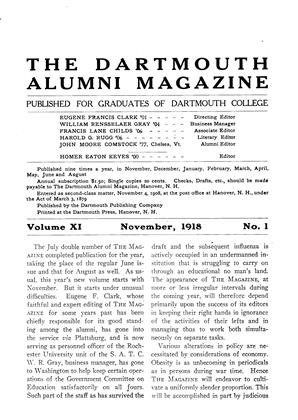The Life and Work of George Sylvester Morris '61. A Chapter in the History of American Thought in the Nineteenth Century
November 1918 WILLIAM KELLY WRIGHTThe Life and Work of George Sylvester Morris '61. A Chapter in the History of American Thought in the Nineteenth Century WILLIAM KELLY WRIGHT November 1918
By R. M. WENLEY. New York, The Macmillan Company, 1917, pp. XV, 332.
George Sylvester Morris, native of Norwich, Vermont, and a classmate of William Jewett Tucker, both at Kimball Union Academy and at Dartmouth, had become one of the foremost teachers and writers in the field of philosophy at the time of his death on March 23d, 1889, in his forty-ninth year.
This work begins with an interesting account of life in northern New England in the time of Morris' youth. Congregationalism of the strict Calvinistic sort was then still the generally accepted faith. Morris, the youngest member of the class of '61, and thought by many to be its most brilliant scholar, had been strengthened in his ancestral faith by his college course, and he planned after graduation. to study for the ministry. The transition in Morris' convictions from early dogmatism to a more liberal but not less earnestly religious idealism,—a transition typical of this epoch,—gives the book its subtitle.
The first year after graduation he was principal at Royalton Academy; 'the second, he was a corporal in the 16th Regiment of Vermont Volunteers; the third, he was back again at Dartmouth as tutor in Greek and Mathematics. In 1864, he entered Union Theological Seminary, where he found the arguments of Paley and similar writers unconvincing. He determined to study philosophy and theology in Germany, which then was preeminent in such subjects. Returning to the United States in 1868 with a maturer philosophical outlook, he became one of the leading exponents of the philosophy of Kant and Hegel. He was a vigorous champion of an enlightened idealism, in opposition, on the one hand, to the traditional dogmatism of his youth, and on the'other, to the materialistic and agnostic tendencies which seemed to many of that generation to be the last word of science. He thus did much to reconcile the claims of religion and science, and to find a place for both in the minds of thoughtful men.
His work as a professor of philosophy was chiefly done at the University of Michigan, though for a few years he was away for one semester of each year, lecturing at Johns Hopkins. Among his more famous pupils at Hopkins were John Dewey, Joseph Jas-trow, Henry L. Osborn, Benjamin C. Burt, W. H. Howell, Allan Marquand, Richard C. Burton, and Fred M. Taylor. Among his philosophical colleagues at Michigan were George H. Howison and John Dewey.
His reputation as a scholar was established by his edition of Ueberweg's "History of Philosophy," which is not merely a very careful translation, but contains numerous additions by Morris, aggregating 17,000 words. Later books were: "British Thought and Thinkers"; "Kant's Critique, a Critical Exposition"; "Philosophy and Christianity"; "Hegel's Philosophy of the State and of History."
Of his personality as a Dartmouth student, President Tucker says that he "had a remarkably truth-loving mind, and the quiet but sure courage to meet its demands." Judge Henry Clay Ide, who was in his classes the year that he was a tutor at Dartmouth recalled him alter fifty years as "a slender young man, of light complexion, with a scholarly, thoughtful face, and quiet, gentlemanly manners, courteous to all the young students who had the benefit of his scholarship, and zealous to be of real assistance to all who came under his instruction." Professor Dewey says of him in his prime: "There are teachers who inspire, but their inspiration, tested by time, appears mainly emotional, and hence temporary, transient. There are scholars who are thorough and honest, but whose attitude towards their subjects seems, if not perfunctory and formal, at least professional, a tradesmanlike affair. Mr. Morris was of that rarer group where scholarship blends with enthusiasm; where competent technical methods lend themselves to the support of inspiration. I cannot imagine either the student indifferent to philosophy or the student whose main concern with it was professional leaving Professor Morris' classes without having a respect for the disinterested play of the mind,—for scholarship not as a badge of possession or external accomplishment, but as a vital concern." But perhaps the strongest testimony to the lasting greatness of Morris is the fact that so many years after his death, another American philosopher of eminence, now his successor at Michigan, should have devoted extensive labor and research to the preparation of his biography.
 View Full Issue
View Full Issue
More From This Issue
-
 Article
ArticleTHE COLLEGE IN KHAKI—WHAT THE S. A. T. C. IS AND HOW IT WORKS
November 1918 By Ernest Martin Hopkins -
 Article
ArticleThe July double number of THE MAGAZINE completed publication for the year,
November 1918 -
 Article
ArticleMEETING OF THE BOARD OF TRUSTEES
November 1918 -
 Article
ArticlePROFESSOR FRANK ARTHUR UPDYKE
November 1918 -
 Article
ArticleTHE DARTMOUTH COLLEGE TRAINING DETACHMENT, N. A.
November 1918 By Charles A. Holden '95 -
 Class Notes
Class NotesCLASS OF 1894
November 1918 By Charles C. Merrill
WILLIAM KELLY WRIGHT
Books
-
 Books
BooksFaculty Articles
December 1956 -
 Books
BooksMORE THAN MERE LIVING,
May 1940 By F. L. Childs '06 -
 Books
BooksGOVERNMENT CAREER SERVICE
November 1935 By Harold J. Tobin '17 -
 Books
BooksTHE IGNORANCE OF CERTAINTY.
MARCH 1971 By JOHN HURD '21 -
 Books
BooksTHE INCHWORM WAR AND THE BUTTERFLY PEACE.
JANUARY 1971 By SYLVIA MORSE MCKEAN -
 Books
BooksNative Wood-notes
JUNE 1983 By Wilfrid Mellers



